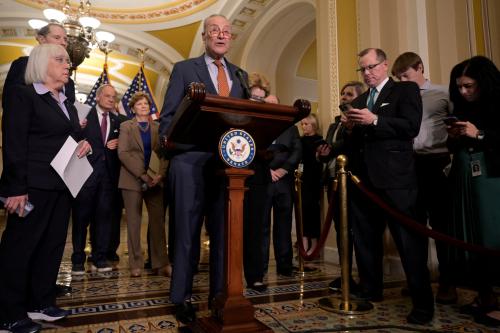On April 4, 2014, the Brookings Institution hosted a panel marking the release of Still Ours To Lead: America, Rising Powers, and the Tension between Rivalry and Restraint, a new book by Bruce Jones, senior fellow and director of the Project on International Order and Strategy (IOS). Still Ours to Lead examines American leadership, demonstrating how the U.S. can lead, preserve, and strengthen the international order.
Jones was joined by Brookings President Strobe Talbott, Senior Vice President and Director of the International Security Program at the Center for Strategic and International Studies Kathleen Hicks and IOS Senior Fellow Robert Kagan, as well as moderator Margaret Brennan, a foreign policy correspondent at CBS News.
Following a presentation by Jones on Still Ours to Lead, the panelists discussed U.S. leadership in the context of current events, which included the Iranian nuclear negotiations.
Jones explained that international cooperation behind the Geneva interim nuclear agreement signed by the P5+1 and Iran exemplifies a concept of tension between rivalry and restraint, which he highlights in his book. Jones contends the coalition of countries that came together are not necessarily allies, but they agree on a central premise. “You do see Russia and China playing important roles,” Jones explained, “not out of love for the West, not out of some benign sense of the global good, but because they have interests. And among their interests is to not let Iran have a nuclear weapon,” in addition to keeping the Strait of Hormuz open.
At the same time, however, Jones argued that while sanctions imposed by the European Union and United Nations Security Council were important, Iran was brought back to the negotiating table due to the targeted and U.S. Treasury-led financial sanctions. According to Jones, “The temptation will be to pull away pressure too soon. But the international community should not release the sanctions at the signing of any deal, but rather at the implementation of a deal.”
Brookings President Strobe Talbott also discussed Russia’s involvement in the P5+1 talks, and argued that we should not assume that Russia will always support negotiations. “If it came down to a choice between advancing the cause of prohibiting Iran from having a nuclear weapon by allowing the United States to get a big diplomatic win,” he said, “[Putin] would say no.”
Later addressing a question from the audience, Brookings Senior Fellow Robert Kagan argued that even if Iranian President Hassan Rouhani is trying to reintegrate Iran into the international system – which Kagan said “would be the right thing to do” – he may not ultimately be able to convince his government to do so. “On the one hand he has to persuade the Americans to do X, and he’s also got to persuade his own government to do Y. That’s a very difficult balancing game,” he explained.



Commentary
Iran Nuclear Talks: Rivalry and Restraint Among Rising Powers
April 7, 2014